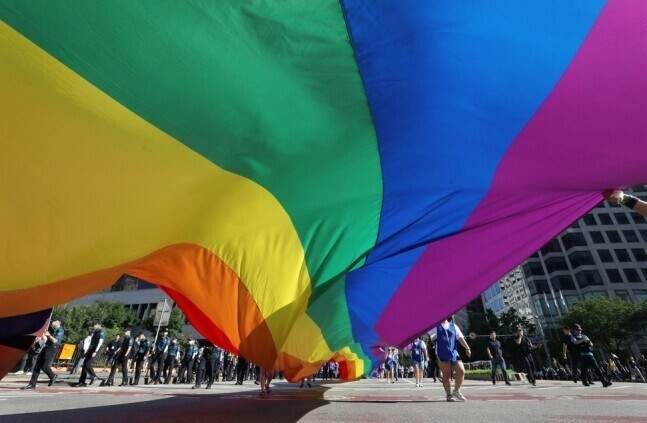Human Rights Commission conducted a survey of 591 transgender people
Not only society, such as school and work, but also family
Diagnosis of depression and panic disorder due to various discrimination and hate

Queer Culture Festival site. Hankyoreh material photo.
A survey found that transgender people (those with a gender identity different from the gender specified at birth) suffer serious discrimination and hatred in almost every area of their life, including school, work, and family life. 65.3% of the respondents who participated in the survey said that they have suffered discrimination because of their transgender identity or their gender expression. The National Human Rights Commission of Korea announced on the 9th the results of a survey conducted with the Sookmyung Women’s University Industry-Academic Cooperation Foundation for the first time as a national institution. In this fact-finding survey, 189 trans women (birth gender is male, but identified as female), 189 trans male (birth gender is female, but identified as male), and non-binary (those who deviate from the criteria for distinguishing men and women). 591 transgender people aged 19 and over residing in Korea, including 221 women by designated gender and 70 men by designated gender, participated in an online survey on October 7-31, 2020. In the survey results, 501 out of 588 respondents (85.2%) said they had experienced discrimination in the past 12 months. Specifically, those who answered that they suffered discrimination because of their transgender identity or their gender expression was the highest at 65.3%.
1 in 3 “hidden identity from family”
One in three transgender people had their identity hidden from their families as well. Out of 591, 203 (34.4%) answered that’no one in the family knows that I am transgender’. 152 (25.7%) responded that'(family) objected or disregarded’, and 96 (16.2%) said that’no support, no objection or disregard’. 140 people (23.7%) answered’supporting’. 373 people who answered that their family knows their identity were △ (family members) pretending to be unaware (56.6%) △ preventing them from expressing their desired gender (44.0%) or △ verbal violence (39.4%) △ They answered that they experienced experiences such as refusing to talk for a long time (27.9%). In addition, 10.5% and 9.4% of experiences of physical violence or being expelled from the house were counted, respectively. Respondents also suffered hatred and discrimination at school. Of the 584 people who had attended middle and high school, 539 (92.3%) answered that they had a difficult experience due to lack of education related to sexual minorities or wearing school uniforms that do not match their gender identity. In addition, 67% of the 585 respondents said that they had heard the teacher’s demeaning remarks during class, and 21.3% said they received violence or unfair treatment from teachers. Of the 469 people who attended university or graduate school, 198 (42.4%) said they had been exposed to sexual minority demeaning comments or actions from professors or lecturers.
57.1% gave up job search experience
Many transgender people also reported that they experienced discrimination in their job search and work life. Of the 469 people who have had job search experience in the last five years, 268 (57.1%) answered that they had given up on job search related to gender identity. 48.2% (226 people) answered that they were pointed out that their appearance was not like a man or woman in the process of finding a job or hiring. In addition, in the workplace where they are currently employed, △regardless of their appearance and tone as male or female (26.6%), △their gender identity was known without their consent (8.9%) and △sexual harassment or sexual assault (8.2%). They also complained of discomfort due to their gender identity in the use of public facilities such as toilets. Out of 589, 241 (40.9%) answered that they used a toilet of a gender different from their identity for fear of unfair treatment or unpleasant gaze when using public toilets. It was counted that they avoided using the toilet by △not eating drinks or food (39.2%), △using the toilet for men and women or the disabled (37.2%) △ giving up on the toilet (36.0%). Transgender men, male at birth, also struggled in military life. Of the 109 respondents currently serving or completing military service, 63 (58.3%) complained that they were having difficulty using shared shower facilities, and 57 (52.8%) feared that their identity would be known. Appeared.
57.1% depression, 24.4% panic disorder
Of the 591 respondents, 177 (30%) said their health was generally poor, and in 2019 alone, 337 (57.1%) of 590 had depression and 143 (24.4%) had experience of diagnosing or treating panic disorder. I said yes. Transgender people who participated in the survey were △elementary, middle and high school curriculum that does not respect gender identity △Lack of comprehensive anti-discrimination law △Resident registration number containing gender information △Institutional discrimination related to LGBTI people such as non-guaranteed family members of LGBTI people such as same-sex marriage or adoption. He picked it up and ordered it to be improved urgently. Sookmyung Women’s University’s Industry-Academic Cooperation Foundation said in a survey report, “transgender people in Korea are experiencing serious hatred and discrimination in many areas of life, but the laws, policies, and systems for this are very insufficient.” We must actively take steps to prevent and create a human rights-friendly environment.” By Jang Pil-soo, staff reporter [email protected]
